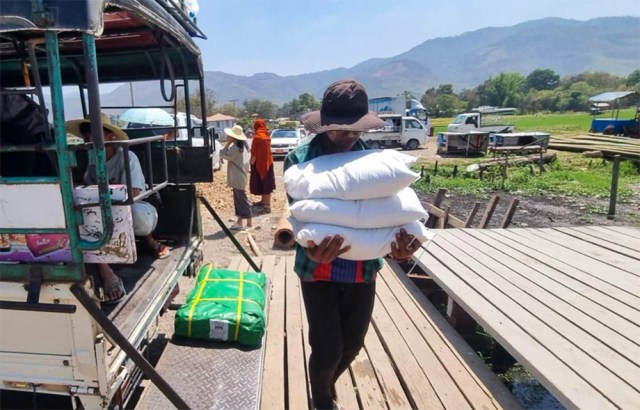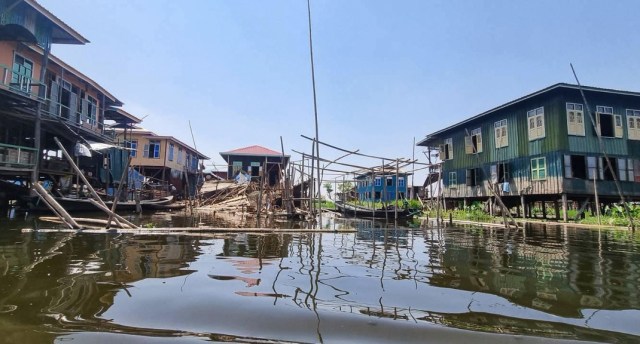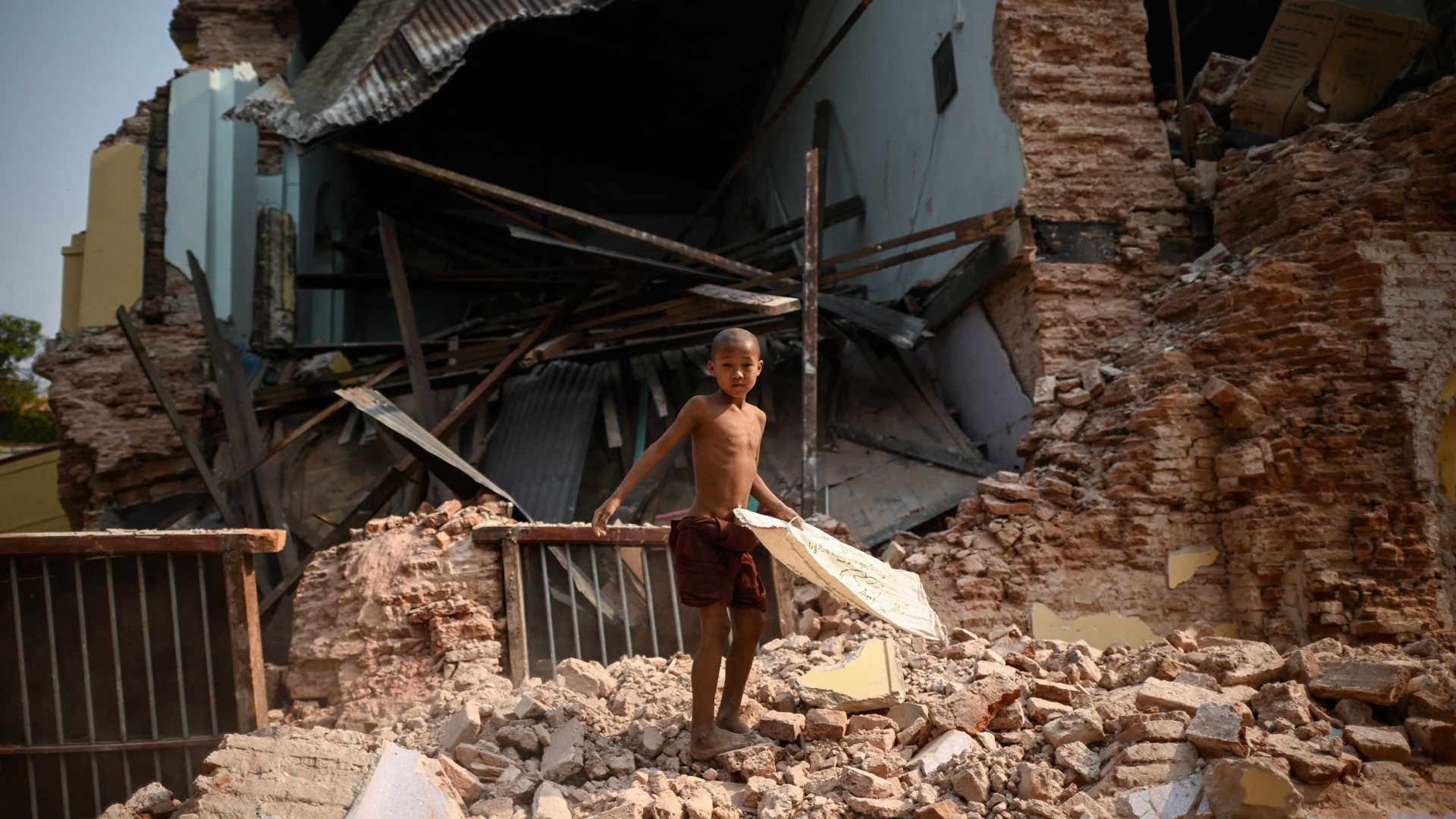Lal Ruat Cawk, pastor of Victory Life Church in Mandalay, Myanmar, was driving with his sister to the hospital for a prechemotherapy blood test last Friday when his car started shaking violently. He thought he had punctured a tire.
“I could hear people screaming outside,” he recalled. “At that point I still thought it was because our car was disrupting traffic.”
It was only when he saw buildings collapsing around him that the 43-year-old realized “we had a larger disaster upon us.” He’d later learn that a 7.7 magnitude earthquake had hit central Myanmar. Mandalay, Myanmar’s second-largest city, was one of the cities worst hit by the quake.
Two aftershocks hit minutes later, prompting Lal Ruat Cawk and his sister to turn the car around and drive home. The journey that typically took 20 minutes lasted an hour that day, amid buckled roads and crushed buildings.
They returned home to find parts of their neighborhood flattened and their home partially destroyed. The pastor watched as rescuers pulled bodies out of the collapsed building. It left him feeling hopeless, especially as the disaster hit amid Myanmar’s ongoing civil war.
“Apart from God, there is no other person in the country we can rely on in the midst of these things,” said the pastor, who is currently sleeping in the streets due to concerns of his house’s structural integrity and future aftershocks.
The death toll in Myanmar has surpassed 3,000, with more than 4,500 people injured, according to state television MRTV. Yet relief aid is proceeding slowly, as humanitarian groups say the military government has blocked access to some quake-stricken areas.
Poor infrastructure and the lack of manpower from within the war-torn country—scores of young and skilled workers have fled since a military coup in 2021—also hinder relief and subsequent rebuilding efforts.
On Wednesday, the military declared a temporary truce in the war to facilitate relief efforts, despite earlier rejecting cease-fire proposals by ethnic armed groups.
Before the cease-fire, the junta continued to bomb parts of the country amid the earthquake in what it described as “necessary protective measures.” Tom Andrews, the United Nation’s special rapporteur on the human rights situation in Myanmar, called for the attacks to stop and for obstructions to aid to be lifted.
“[The attacks] are outrageous and should be condemned in the strongest possible terms by world leaders,” Andrews wrote on X on Wednesday.
Countries around the world have sent emergency aid, including tents, blankets, hygiene kits, food, teams of rescue workers, sniffer dogs, and millions of dollars to Myanmar. However, some of it hasn’t reached earthquake victims, as the military junta is blocking its delivery.
For instance, many trucks carrying aid have been stuck overnight at military checkpoints in Sagaing, where the fighting between resistance groups and the military is intense, say several rights groups, including the Centre for Ah Nyar Studies.
On Wednesday, the junta admitted to opening fire at a Chinese Red Cross aid convoy, highlighting how the civil war complicates relief efforts. While the convoy said it had informed the military of its aid delivery plans, the military said it had not been notified.
“The junta is asking for international aid and has declared a state of emergency in the regions hit hardest, but their actions do not align with what they’re saying,” said Claire Gibbons, strategy manager at Christian aid group Partners Relief and Development.
This made it “incredibly difficult” for aid to reach those most affected, and Gibbons anticipates that rebuilding efforts will be hampered by the civil war. At the same time, the country’s health system has been ranked one of the poorest in the world by the World Health Organization.
 Courtesy of Partners Relief & Development
Courtesy of Partners Relief & DevelopmentPartners Relief and Development, which has been in Myanmar since 1994, focused its relief efforts at Inle Lake, a former tourist spot south of Mandalay. The earthquake has completely destroyed many of the houses there, which are built on stilts in the water. Residents are struggling to build even temporary shelters with the limited land.
“Since COVID and the military coup, people here have lost most of their jobs from the tourist industry … so they are already struggling financially. They needed help before. They need more now,” said a Partners staff member on the ground, whom CT granted anonymity for security reasons.
The staff member noted that the locals need food, shelter, and drinking water most immediately. The aid organization distributed 600 bottles of waters, 5,500 pounds of rice, and 60 tarpaulins during its first visit on Tuesday, but the residents still need more.
“When they heard [we were] coming to make distributions, many people from the community got into their boats to wait for us. … Even then, the supplies we distributed [pale] in comparison to what they need,” he said.
The Way Station, a Christian nonprofit in Mandalay that supports women and children, says it has managed to bring aid to earthquake victims by working with partners in Yangon.
Overland journeys from Yangon to Mandalay can take up to 15 hours in current conditions, and the organization managed to get its first truck of food supplies and solar-powered generators to its community on Monday.
“The people we work with are among the poorest of the poor,” said Sandie Lund-Steinheuer, who cofounded The Way Station with her husband, Paul. “They already had next to nothing even before the earthquake and have been living in makeshift shelters for decades. The need is massive. The funds we have been able to raise is but a drop in the ocean.”
 Courtesy of Partners Relief and Development
Courtesy of Partners Relief and DevelopmentSandie and Paul, who are coordinating fundraising from Denmark while communicating regularly with teammates in Mandalay, say they have been encouraged by how believers have been reminding one another of the hope they have in Jesus.
“In the midst of all this, they are concerned about whether or not Sunday services can still take place,” Paul said. “In the developed Western world, it is easy to put our hope in our circumstances. But Myanmar has been embroiled in crisis after crisis, so much so that you see Christians there living out the truth that there is no other hope but God.”
Other Christian aid groups are also seeking ways to help. On Monday, Samaritan’s Purse’s DC-8 jet took off from Greensboro, North Carolina, with an emergency field hospital and 28 disaster response specialists, including doctors and nurses, onboard headed to Myanmar. The hospital will include two operating theaters, an emergency room, inpatient wards, a pharmacy, and a laboratory. Meanwhile, Viriginia-based Operation Blessing sent a team to Mandalay with water-purification equipment, solar lanterns, and emergency supplies, including food, toothbrushes, bottled water, and medicine.
Lal Ruat Cawk is praying that the crisis will cause non-Christians to call upon the Lord for help.
“Pray that they will acknowledge that disasters like that are beyond human control and that only God can help us recover from this crisis,” he said. “Pray, too, that more Christian organizations will be able to come into the quake-affected areas to help us see and experience God’s love in the midst of this.”














